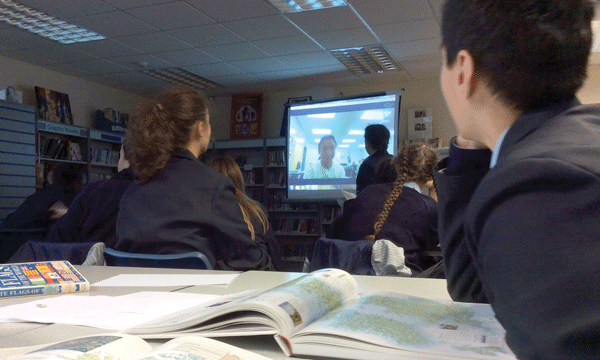Five Tips For a Successful Mystery Skype
 Mystery Skypes are one of our most popular programs. Here’s how it works: Your class Skypes with another class, and by asking yes or no questions, each class tries to guess where in the world the other students are. Here are some suggestions to make the most of your Mystery Skype.
Mystery Skypes are one of our most popular programs. Here’s how it works: Your class Skypes with another class, and by asking yes or no questions, each class tries to guess where in the world the other students are. Here are some suggestions to make the most of your Mystery Skype.
Prepare
Visit the classroom at least once before the event to give them a few pointers, including asking the students to prepare questions in advance and to explain to them how a Mystery Skype works. For example, to avoid confusion and a lot of noise, it’s best if the students stand up and approach the computer to ask their questions one at a time. Decide how difficult you want to make the event for the other school and what answers you will accept. For example, we are located in a borough of London, but if a class guesses London, we always say, “No.” We make the class guess Sutton, which is the name of our borough. It’s a good idea to make signs to explain what you are doing. One class we recently Skyped with had laminated signs that said, “Our Turn,” “Your Turn,” and “Thinking, please wait....” Not only did this help with the general flow of the program, it’s great if the sound cuts out! Have a bank of questions prepared in case your class gets stuck or your students are suddenly shy, and have the students prepare some interesting facts about your hometown or state to share with the other class in case the classes guess the location early.
Put students in control
One student should be in charge of writing the information collected somewhere the entire class can see it. You could also designate lead researchers, those who have come up with a lot of questions beforehand and want to take the reins when it comes to asking the questions.
Check time zones and conduct a test
This is especially important for classes in different countries with large time differences. Contact the staff member you are Skyping, and run a test a few days before to make sure your times are correct and your equipment is working properly.Combine old and new technology
My students use iPads and atlases. I also provide pencils and paper so they can jot down any information that they deem relevant. The students learn how to use an atlas and can search Google Earth or Google Maps using iPads or computers.Involve other departments
I approached the geography department to involve them and make it part of the curriculum. The teachers really love to watch this event in action. I also promote the Skypes heavily at staff meetings and in our newsletter, so that any teacher who might find themselves with a rare free period could stop by the library and take part. If you are interested in a Mystery Skype, please get in touch—we are always looking for new classes to connect with!Lucas Maxwell is a librarian at Glenthorne High School in Sutton, England. He was the 2017 UK School Librarian of the Year.
RELATED
The job outlook in 2030: Librarians will be in demand
The job outlook in 2030: Librarians will be in demand
ALREADY A SUBSCRIBER? LOG IN
We are currently offering this content for free. Sign up now to activate your personal profile, where you can save articles for future viewing






Add Comment :-
Comment Policy:
Comment should not be empty !!!
Cynthia Gabriel
This sounds like so much fun! I want to do this with my high school "Mysteries of the World" class this spring!Posted : Mar 28, 2018 12:31